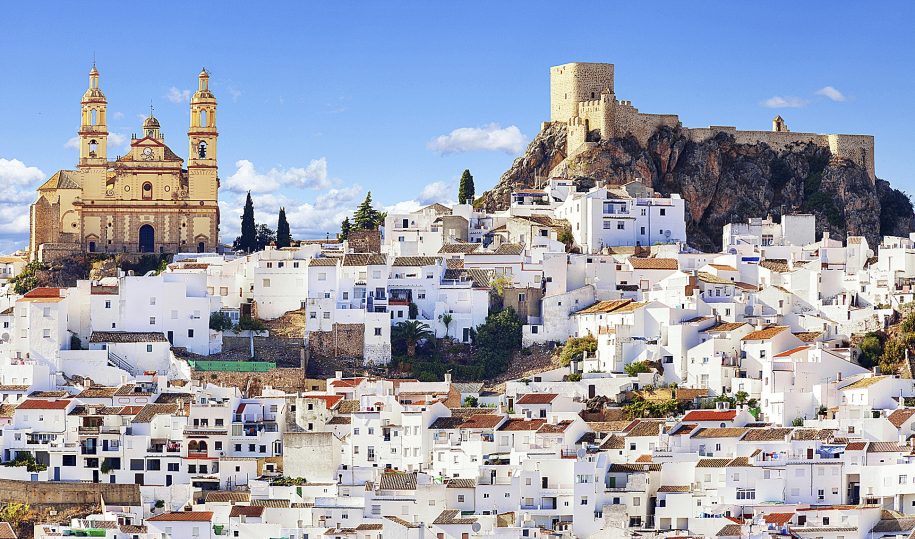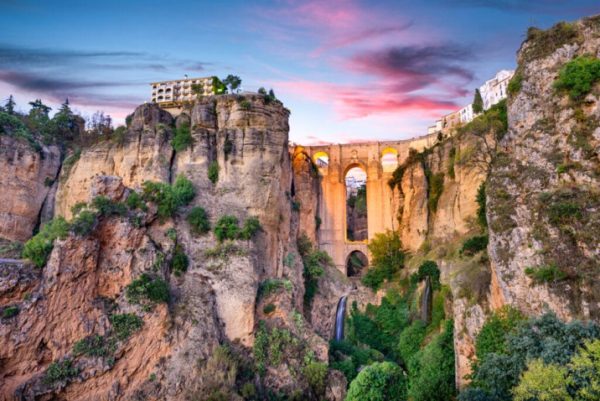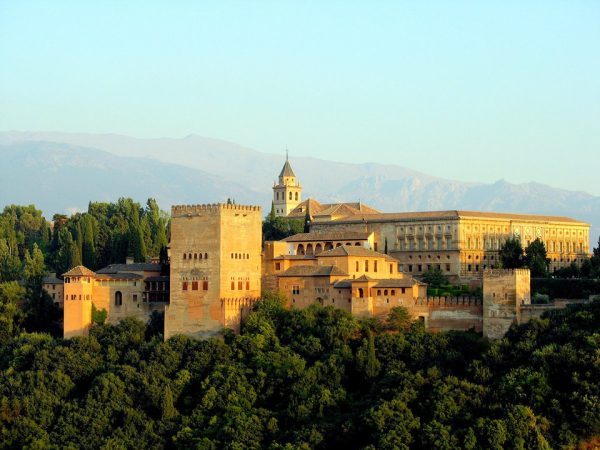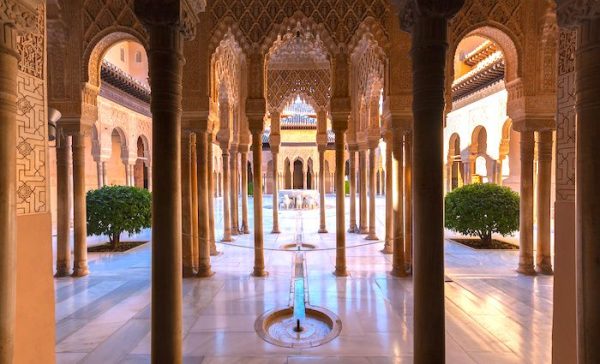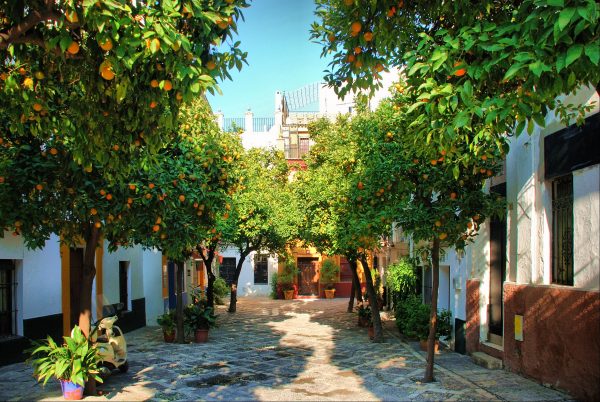Between Cádiz and Málaga in the Andalucian mountains you find some of Andalucias most valuable treasures. The beautiful whitewashed villages with labyrinthic cobber streets decorate with colorful flowers of Andalusia. This place is where time stands still and you find the tranquility you were searching for. Here you can unite with nature and contemplate the most spectacular landscapes among pinsapo trees. You find wonderful hiking routes to explore. Discovering amazing history and traces from the many civilisations that have lived in this region in the past.
Here we will show 8 of the most stunning white villages you can enjoy while you are experiencing Andalucia.
Ronda
Ronda , where the long Andalucian history has left its proof from many different civilizations. Where the ancient traces all the way back to Roman times make it one of the most interesting cities in all of Andalusia. The landscape, the amazing cliff, the romantic legend of its bandits, the cradle of bullfighters and artists whose names have gone down in history: is what makes Ronda an incredible city.
Ronda has been an inspiration to many distinguished writers and poets like Pliny, al-Motámid the poet-king of Seville, al-Idrisi, Ibn al-Jatib and Rilke, that are just a few of the authors who have all been fascinated by the charm in every street and corner of this captivating white village. The city invites you to stroll through its many narrow streets on the edge of the cliff and over the “ Puente nuevo” ( new bridge) making a stop in every peculiar corner absorbing every detail of the old town.
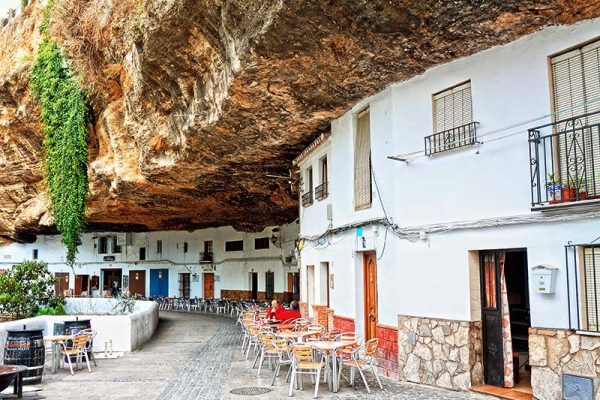
Setenil de la Bodega
Setenil de las Bodegas is one of those charming villages with unique characteristics that favour Sierra de Cádiz as one of the most beautiful and picturesque regions in Spain. The village has been a unique place to settle from ancient times with the cascades down from the Castle alongside the river Guadalporcún.
Setenil de las Bodegas is part of the route of the White Villages of the Sierra de Cádiz, its peculiar caves and natural recess in the mountain did not take long to shelter its first settlers. Later the caves turned into houses,and today Setenil is one of the most visited white villages in the Cadiz region. In addition, it belongs to the association of The Most Beautiful Towns of Spain and Its urban structure has been declared Historic Conjunction
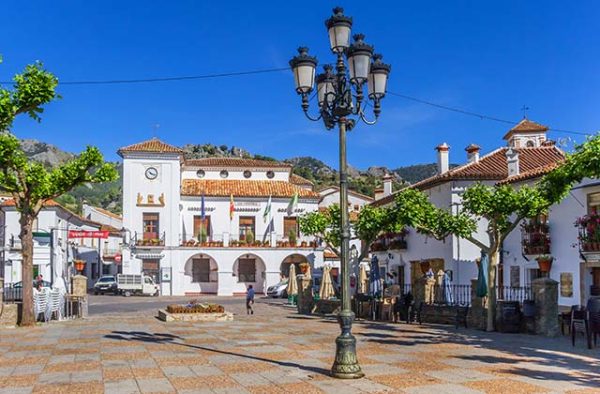
Grazalema
The village of Grazalema, is the highest and mountainous village in the Sierra de Cadiz. Considered the wettest village in Spain. Placed in the The natural park Sierra de Grazalema that was declared a biosphere reserve in 1977. The highest mountain peak in Cadiz, El Torreón, is an attractive goal for experienced and not so experienced hikers.
The village is considered one of the most charming villages in the province and the finest example of the beautiful white villages, proud of their roman and moorish history first know with a moorish name Raisa lani suli, “city of the Banu al-Salim’, which became Ben-salama “son of Zulema’, and later Gran Zulema.
Today, most of the locals living in Grazalema are working in the agriculture, and produces lovely local products such as goat cheeses and producing excellent olive oil and hand craft textiles, in addition to tourist services for the expanding tourism industry attracted by the unusual sceneries of Sierra de Grazalema Natural Park and by the beauty of this mountain village.
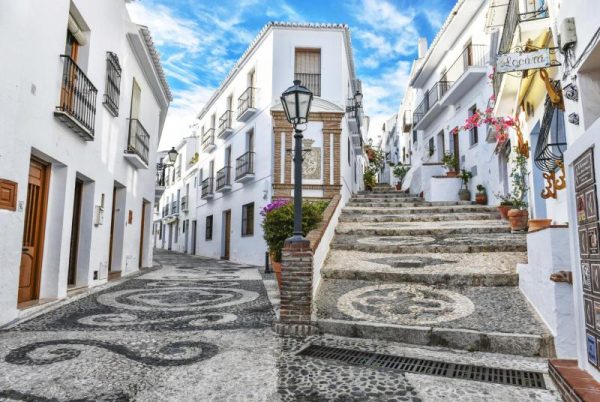
Frigiliana
Frigiliana, is a historical city as many other white villages. Its roots date back to Roman times but it was the Muslums that gave Frigiliana its urban design and shape as the first real settlement was established after the Moorish invasion of Frigiliana in the 11th century protecting the city with a fortress. The village is situated 300 meter above sea level offering the most spectacular views over Nerja and the Costa del Sol coast. On a clear winter day you can even see the North African Coastline from its privileged situation in the Sierra Almijara.
A stroll in the streets of Frigiliana, is worth every minute of it, its beautiful designed cobbled streets decorated with marvelous stone pattern and the white washed house walls are adorned with colorful decorative flowers. In the upper part of the city is where you find the Moorish antique neighbourhood. The doors are painted in arrey pastel colors and between nooks and crannies it opens up amazing viewing points to overlook the Mediterranean sea and the wonderful countryside. Well known writers and poets have lost their soul and found their inspiration in this village. No wonder Frigiliana has been awarded and is considered as one of the prettiest white villages in Andalucia.
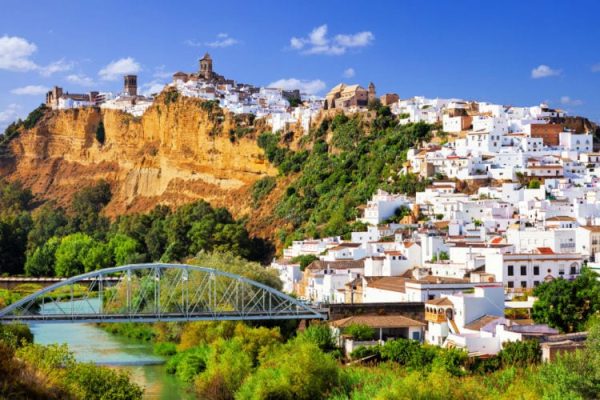
Arcos de la Frontera
You find this stunning village in the Cadiz province as many other dotted white villages in Andalucia. The history of Arcos de la Frontera is intense, and the best way to evidence this is a lovely stroll in the narrow streets of Arcos’ old town that was declared a Monument of Historical and Artistic Importance in 1962. Numerous publications describe Arcos de la Frontera as the most beautiful town in Spain.
The picturesque town is situated in beautiful Andalusian scenery, between mountains and countryside. Located on top of a rock, granting us spectacular views of the surrounding area. The Castle together with the churches of Saint Mary and Saint Peter are highlighted monuments with great beauty and can be discovered in the charming infinity of nooks and crannies in the labyrinth white washed streets.
For many peace seekers, Arcos de la Frontera, is their favourite destination in Andalucia. The relaxing ambience away for hustle and bustle , with easy approach to the main cities in the occidental part of Andalucia and to stunning Atlantic ocean beaches has proved the popularity among European tourists looking for an idyllic and traditional wedding location.
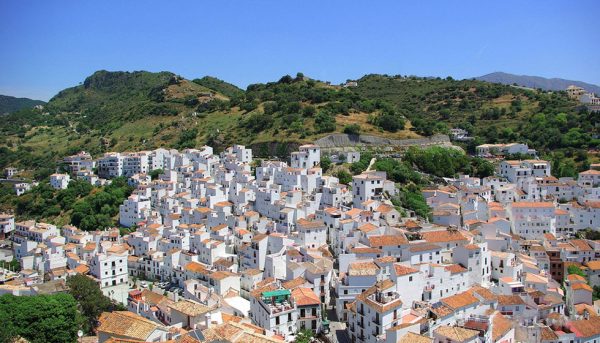
Casares
Casares village is one of the valuable treasures among the tophill white villages situated between the Serrania de Ronda, the Costa del Sol and the Campo de Gibraltar region, with panoramic views down to the Mediterranean sea and across to the north African coastline.
The village is declared a Village of Historical and Artistic Importance and its roots originate to Roman times, but the village as it is today , however, is of Arabic influence. The historical Moorish Casares Castle ruins from the 12th century, crowns the city, and according to excavations Casares became a point of great importance as one of the forts located between the coast of the Strait and the Ronda Mountain Range. The city gave birth to Blas Infante, a politician and writer considered to be the founding father of Andalusian nationalism.
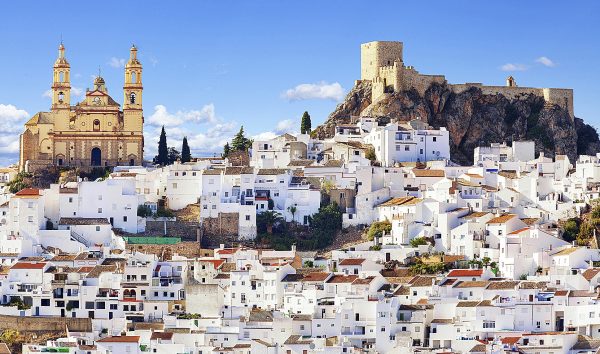
Olvera
«Olvera is a paradise in the heart in what’s called the “ Pueblos Blancos “ or the white villages in the mountain range of Cadiz.
On the hillside with whitewashed houses and alleys erected among olive groves and crowned by the historical castle and the old town raised in Nazari times. The village is highly valued by locals as well as tourists looking for true nature and marvelous landscapes. The streets in the historical part, twists carelessly on the slope of the land, firmly keep the aroma of the plants that adorn walls and windows,examples of popular architecture, all built in the typical style of the Andalusian white villages.
The village proudly looks out to contemplate the colossal figure of its 12th-century Moorish castle, silent witness of Olvera’s history. The town stretches across the mountainside, a mixture of stately homes In the charming downtown the churches raise their towers proudly towards the sky, representing stunning images collected from a postcard.
In the extreme north east of the Sistema Betico range, among gently rounded mountains and fields of cereals and olive trees. The highlight of this Sierra is the Peñón de Zaframagón, declared a Nature Reserve, which is home to the largest concentration of tawny vultures to be found anywhere in Andalusia.
